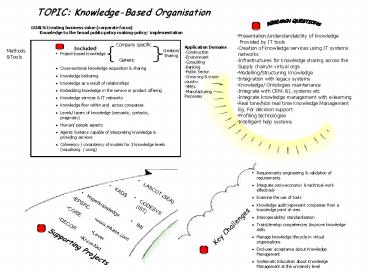TOPIC: KnowledgeBased Organisation - PowerPoint PPT Presentation
1 / 1
Title:
TOPIC: KnowledgeBased Organisation
Description:
Train/develop competencies /improve knowledge skills ... DECOR. Know-Net. Lever. Application Domains -Construction -Environment -Consulting -Banking ... – PowerPoint PPT presentation
Number of Views:17
Avg rating:3.0/5.0
Title: TOPIC: KnowledgeBased Organisation
1
TOPIC Knowledge-Based Organisation
RESEARCH QUESTIONS
GOALSCreating business value (corporate focus)
Knowledge to the broad publicpolicy
making-policy/ implementation
-Presentation/understandability of knowledge
Provided by IT tools -Creation of knowledge
services using IT systems networks -Infrastructur
es for knowledge sharing across the Supply
chain/in virtual orgs -Modelling/Structuring
Knowledge -Integration with legacy
systems -Knowledge/ Ontologies maintenance -Integr
ate with CRM. BI, systems etc -Integrate
knowledge management with e-learning -Real
time/Non real time Knowledge Management Eg. For
decision support -Profiling technologies -Intellig
ent help systems
Company specific
Included
Application Domains -Construction -Environment -Co
nsulting -Banking -Public Sector -Cross-org
cross-country -SMEs -Manufacturing Processes
Methods Tools
Creation/ Sharing
- Project-based knowledge
- Cross-sectorial knowledge acquisition sharing
- Knowledge brokering
- Knowledge as a result of relationships
- Embedding knowledge in the service or product
offering - Knowledge services IT networks
- Knowledge flow within and across companies
- Levels/ layers of knowledge (semantic, syntactic,
pragmatic) - Human/ people aspects
- Agents Systems capable of interpreting knowledge
providing services - Coherency / consistency of models for 3 knowledge
levels (visualising / using)
Generic
- Requirements engineering validation of
requirements - Integrate socio-economic technical work
effectively - Examine the use of tools
- Knowledge auditrepresent companies from a
knowledge point of view - Interoperability/ standardisation
- Train/develop competencies /improve knowledge
skills - Manage knowledge lifecycle in virtual
organisations - End-user acceptance about Knowledge Management
- Systematic Education about Knowledge Management
at the university level
KADS
LASCOT (SEA)
Hyperknowledge
- EPSRC
CODESYS (IST)
- CORE
Key Challenges
- DECOR
IMI
- www.Inkass.com
- Lever
Supporting Projects
- Know-Net































